
– 10-12-2023-
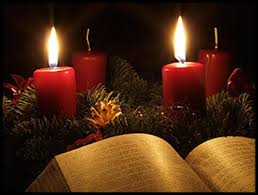
Gospel Text : Mark 1:1-8
vs.1 The beginning of the Good News about Jesus Christ, the Son of God.
vs.2 It is written in the book of the prophet Isaiah:
Look, I am going to send my messenger before you; he will prepare your way.
vs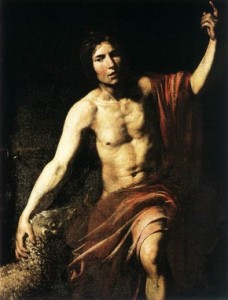 .3 A voice cries in the wilderness: Prepare a way for the Lord, make his paths straight.
.3 A voice cries in the wilderness: Prepare a way for the Lord, make his paths straight.
vs.4 And so it was that John the Baptist appeared in the wilderness, proclaiming a baptism of repentance for the forgiveness of sins.
vs.5 All Judaea and all the people of Jerusalem made their way to him, and as they were baptised by him in the river Jordan they confessed their sins.
vs.6 John wore a garment of camel-skin, and he lived on locusts and wild honey.
vs.7/8 In the course of his preaching he said,
“Someone is following me, someone who is more powerful than I am, and I am not fit to kneel down and undo the strap of his sandals.
I have baptised you with water, but he will baptise you with the Holy Spirit.”
***************************************************************
We have Three commentators available to choose from:
Michel DeVerteuil Lectio Divina with the Sunday Gospels – Year B
Thomas O’Loughlin Professor of Historical Theology Uni of Nottingham NG7 2RD
Donal Neary Gospel Reflections for Sundays of Year B
****************************************
Michel DeVerteuil
Lectio Divina with the Sunday Gospels- Year A
www.columba.ie
General Comments
 On this Sunday and the next, the Church gives us John the Baptist as the model of the prophet calling people to move from the wilderness or place of despair to a state of hopeful and trusting expectation. He himself was someone who knew how to wait.
On this Sunday and the next, the Church gives us John the Baptist as the model of the prophet calling people to move from the wilderness or place of despair to a state of hopeful and trusting expectation. He himself was someone who knew how to wait.
Like last week’s, this reading is from St Mark’s gospel; it should be read in sections. Omit verse 1 which is an introduction to the entire gospel of St Mark rather than to this part of it.
In verses 2 and 3 you can focus on the fact that the story of John the Baptist was already written in the book of Isaiah, or you can look at the content of the verses. The first two lines are from Malachi, and the pronouns must be interpreted correctly: they are saying that when God is about to come into the life of a person or a community he always sends a messenger to prepare the way for him. In the next part of the prophecy be sure to interpret correctly the meaning of “cries in the wilderness” which means that God’s prophets always announce confidently to those who are in the wilderness that they must not despair, but rather act as if God’s grace will come to them at any moment.
Textual Comments
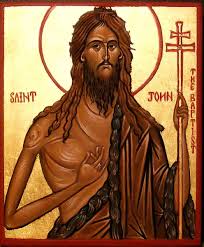 Verses 4 and 5 summarise the mission of John the Baptist who touches a community or nation so that the people commit themselves to a renewed life, recognising their former sins.
Verses 4 and 5 summarise the mission of John the Baptist who touches a community or nation so that the people commit themselves to a renewed life, recognising their former sins.
Verse 6 speaks of the Baptist’s simple lifestyle, in sharp contrast to the extraordinary success of his preaching in the previous verses.
In verses 7 and 8 we get a glimpse of the humility of John the Baptist, a model of waiting. John may have said these words at a time of triumph, showing that he did not let success go to his head, or when he was feeling frustrated and knew he must be content to wait for God’s moment of grace.
Scriptural Prayer Reflection
Lord, we celebrate today our conversion experiences:
* we turned away from drink or something else that was destroying us;
*we took up our courage after a bout of depression;
*we moved from self-centeredness to a life of service.
We remember with deep gratitude the messenger you sent before you
who was to prepare your way:
a sermon, a true friend, one of our children, an illness.
At the time, we were in a wilderness, drifting aimlessly, not going anywhere.
then, as it is written in the books of the prophets,
a voice cried out in our wilderness
that we were not destined to remain there forever, that we could expect a moment of grace.
Lord, we thank you for our John the Baptists:
– a Life in the Spirit seminar;
– a local, social, or national leader;
– a new parish priest or a new principal of our school.
The whole community, all Judaea and all the people of Jerusalem,
we made our way to him, we let ourselves be baptised in the river Jordan,
recognising how we had become lazy, self-satisfied and grasping,
and we put the past behind us.
We pray for those who have given their lives to making society more just
and who at this moment find themselves becoming bitter and resentful,
and are tempted to violence.
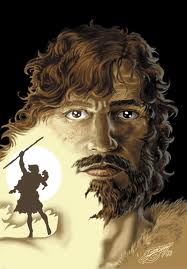 Keep them humble like John the Baptist.
Keep them humble like John the Baptist.
Remind them that it is your sacred work they are doing, that they are unworthy servants,
not fit to kneel down and undo the straps of your sandals.
If they feel they are not achieving much, you are following them;
if they feel powerless, you are more powerful.
They baptise with water, but you will baptise with the Holy Spirit.
Lord, we thank you that in many countries today your church is bringing hope to the lowly, so that once again John the Baptist can cry out good news to those in the wilderness:
– To those who have failed so often that they have given up hope of bettering themselves;
– To those who have been written off as unemployable;
– To those who are being deprived of the minimum resources necessary for survival,
announcing to them that they need not despair, but can be full of hope
because they will now experience that you are in their midst
and they are free, creative members of the human family.
Lord, we are anxious that all Judaea and all the people of Jerusalem
should make their way out to us and be baptised,
but we think it can be done through money or earthly power,
forgetting that your prophets wear a garment of camel skin
and live on locusts and wild honey.
Lord, there are many in our country who have lost hope.
Say to all what you have said to us Christians – that we must not despair but must stay awake.
********************************************************
Thomas O’Loughlin
Liturgical Resources for the Year of Matthew
www.columba.ie
Introduction to the Celebration
Today we move along our Advent journey towards our celebration of the Son of God entering our world, our humanity, and our community. On this Advent journey, our memory this Sunday concentrates on the figure of St John the Baptist: he went before the Lord and prepared his way and made his path straight. He is our model as witnesses to Jesus the Christ: we have to create a path for Jesus to enter our world and we have to remove the obstacles we place, both as a community and as individuals, to his being recognised in our world today.
Homily Notes
1. When we read Mark’s presentation of the ministry of John the Baptist we are confronted with his role as the one who preached ‘a baptism of repentance for the forgiveness of sins’. The immediate thought may be to take this as a cue for preaching the need for the Sacrament of Reconciliation or the need for individual confession. This has been a very common reading of the Baptist’s cry and has the effect of making Advent and Lent seem very similar in many places. However, this approach fails to do justice to the kerygma and obscures our understanding of the nature of the preparation Mark understood John to have carried out; and that preparation is a central part of the work of the gospel for Mark. So avoid in the homily any linking of this text with individual sacramental reconciliation or using it as a cue to draw attention to a Reconciliation Service that is scheduled for Advent.
 2. The key element in John the Baptist’s preaching was the preparation of a new people, a distinct community, the Israel of the last times of the Day of the Lord’s [judgement]. This was not an individualist cleaning out of sins, each putting his or her house in order; but encouraging people to join a new society that would be able to withstand the coming judgement because of the purity of its observance of how the People of God should behave and live as a group.
2. The key element in John the Baptist’s preaching was the preparation of a new people, a distinct community, the Israel of the last times of the Day of the Lord’s [judgement]. This was not an individualist cleaning out of sins, each putting his or her house in order; but encouraging people to join a new society that would be able to withstand the coming judgement because of the purity of its observance of how the People of God should behave and live as a group.
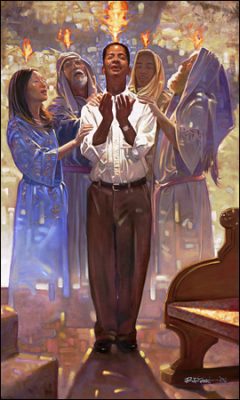 The event that marked one as a member of this new People, new group, was to be baptised by John. His baptism marked the border between being a member of the old community now destined for punishment because of its unfaithfulness to the Law (i.e. sin) and the new community that observed the Law with purity such that it could survive the Day of Lord. The important point to remember is that salvation is corporate, the forgiveness is corporate and the new way of living is corporate.
The event that marked one as a member of this new People, new group, was to be baptised by John. His baptism marked the border between being a member of the old community now destined for punishment because of its unfaithfulness to the Law (i.e. sin) and the new community that observed the Law with purity such that it could survive the Day of Lord. The important point to remember is that salvation is corporate, the forgiveness is corporate and the new way of living is corporate.
We should think of John’s baptism as being more like the day novices enter a monastery, thus beginning a new community life, rather than in terms of individual ‘confession‘. Or more metaphorically, it is all rowing in a lifeboat together rather than having individual lifebelts.
3. Jesus takes over from John the message of the new community of the Last Times, the New Israel with its twelve new foundation members: the Twelve. But unlike John, this new Israel is not the group that can survive the wrathful judgement, but the new People who can keep the Law in spirit and truth and who can rejoice because the Father loves them.
4. By contrast with the picture of the new People that is defined by Jesus’s baptism, i.e. our baptism, John’s community is but a forerunner, a foretaste, a dry run.
 5. To welcome Jesus we must become the new community, the new People of God, the new Israel, the holy royal, priestly people of our baptism. This is the call of today’s gospel. But this means a whole new vision of what it is to be a Christian, and abandoning any notion that Christianity is a religion system for individuals or a salvation system for individuals.
5. To welcome Jesus we must become the new community, the new People of God, the new Israel, the holy royal, priestly people of our baptism. This is the call of today’s gospel. But this means a whole new vision of what it is to be a Christian, and abandoning any notion that Christianity is a religion system for individuals or a salvation system for individuals.
6. So what actions is the community taking this year to help it realise its calling to be the new community that is ‘in Christ’?
• Has it any plans for a more perfect liturgical gathering? In many places people still sit at the Eucharist using the individualist model of ‘getting Mass’: can people actually gather around the table so that it is clear that they are not just getting something but are at the Lord’s banquet?
• Has it any plans to have a programme of prayer which unites it in spirit when it is dispersed? The early Christians offered united prayer by all praying at the same times each day and fasting on fixed days. More recently Christians were united by the Angelus at fixed times. Can the community’s members agree to say the Our Father at a fixed time each day so that they are uniting in prayer even if not physically in the same place?
• Has the community any plan to grow in knowledge and awareness?
Is there any plan to have a group that will study who we are as Christians or study how best to celebrate Christmas? Are there any ways of witnessing to the Christ and his message in the world in which we live?
 • Has the community any plans to re-dedicate itself as a People, the new people, the people who are welcoming the Son of God into their midst? And, how would it do this? This act of rededication of the community could be an Advent reconciliation service, but if so then it has to have the community dimension foremost rather than the individual confession-absolution agenda.
• Has the community any plans to re-dedicate itself as a People, the new people, the people who are welcoming the Son of God into their midst? And, how would it do this? This act of rededication of the community could be an Advent reconciliation service, but if so then it has to have the community dimension foremost rather than the individual confession-absolution agenda.
• Has the community plans to act collectively to ease suffering, poverty, and injustice in our world?
There is need to ‘get organised‘ so that as a community we are making a difference and we are acting in a new way as a new people. You cannot be the New People if the group is still behaving in its way of life in the old way of injustice and exploitation. This new way of acting is essential if we are to be the people of the Christ, but it is not a substitute for renewing the liturgy, having a plan of prayer, and having an awareness of the need to fast as a community.
How will the community express its joyfulness and thankfulness for what it is? Will there be other opportunities to show that being a people is not just a collection of individuals, but being part of a society, a living entity? What activities can we engage in that will act as a glue between us and help us overcome the fragmentation that is such a part of modern western post-industrial living?
7. Advent poses us hard questions. Questions much harder to answer and do something about than those linked with the individualist notion of God-and-me that is inherent in ‘going to confession’.  ‘Preparing a people’ is far harder task for the president of a community than many hours sitting in the confessional.
‘Preparing a people’ is far harder task for the president of a community than many hours sitting in the confessional.
Advent means
getting there
together!
***********************
Donal Neary SJ
Gospel Reflections for Sundays of Year B :Mark
ww.messenger.ie/bookshop/
Weeks of Mercy
 There’s a family expectancy on the air about Christmas, people looking forward to the celebration just now. Even if we dread bits of Christmas, and many do, we know that there is something very good about it. We look forward to it, as we look forward to the visit of someone we love, or a holiday afterwards, or the break from work.
There’s a family expectancy on the air about Christmas, people looking forward to the celebration just now. Even if we dread bits of Christmas, and many do, we know that there is something very good about it. We look forward to it, as we look forward to the visit of someone we love, or a holiday afterwards, or the break from work.
The people at Jesus’ time were like that – looking forward to the ‘one who is to come’. It would all take time, and the last of the messengers was John the Baptist. His mother would await his birth with huge expectation.
He preached forgiveness. This is one of the special gifts of God, and one of the big celebrations of Advent. We are a forgiven people, and we welcome the forgiveness of God in our repentance. This means we are firstly grateful for forgiveness, that we do not have to carry forever the burden of sin, meanness and our faults and failings. God covers them over in mercy.  The second step of welcoming forgiveness is to try to do better in life – to move on from this sinfulness and meanness to a life of care, compassion, love and joy. It is a call and a challenge to forgive others.
The second step of welcoming forgiveness is to try to do better in life – to move on from this sinfulness and meanness to a life of care, compassion, love and joy. It is a call and a challenge to forgive others.
Advent is not complete without some admission of sin and our need for mercy. The parish celebrations of the sacrament of Penance (Reconciliation) in common or individually is step which makes our celebration of Christmas complete.

For this week: say the angelus on wakening, at noon and at 6 p.m.
May our good and gracious God have mercy on us all,
forgive us our sins
and lead us to everlasting life together. Amen.
**********************************